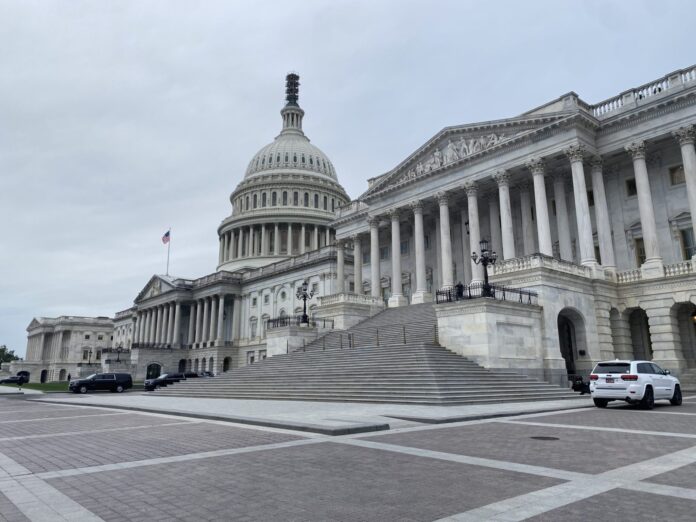
WASHINGTON (States Newsroom) — The U.S. Senate took a broadly bipartisan vote Tuesday to advance a short-term spending bill, but both chambers of Congress must approve the legislation before a Friday funding deadline to avoid a partial government shutdown.
The 68-13 procedural vote moves the bill toward a final vote in the Senate in the coming days, though without a time agreement that vote could slip until next week.
The U.S. House will have to vote to approve the bill after the Senate passes it. That chamber likely has the votes to clear the bill for President Joe Biden’s signature, despite frustration from far-right lawmakers about government spending.
The stopgap bill, sometimes called a continuing resolution or CR, marks the third time this fiscal year lawmakers have leaned on this type of funding measure to extend their deadline for passing the dozen annual government spending bills.
Congress was supposed to wrap up that work before Oct. 1 but has delayed twice before amid disagreements between House Republicans and Senate Democrats over how much to spend during fiscal year 2024 and how much to change policy within those bills.
Speaker Mike Johnson, a Louisiana Republican, and Senate Majority Leader Chuck Schumer, a New York Democrat, brokered an agreement earlier this month to spend $886.3 billion on defense and $772.7 billion for domestic accounts during the current fiscal year.
The Appropriations Committees, however, need more time to work out a final agreement on the bills, which is why Congress is trying to pass another continuing resolution this week.
New March 1, March 8 deadlines
This stopgap spending bill would give lawmakers until March 1 to approve the Agriculture-FDA, Energy-Water, Military Construction-VA and Transportation-HUD appropriations bills and until March 8 to approve the other eight funding bills.
The four bills had been due by Friday and the remaining bills were due Feb. 2 under the last continuing resolution.
Schumer said during a floor speech Tuesday the Senate’s focus this week will be passing the continuing resolution, or CR, as quickly as possible.
“If both sides continue to work in good faith, I’m hopeful we can wrap up work on the CR no later than Thursday,” Schumer said. “The key to finishing our work this week will be bipartisan cooperation in both chambers. You can’t pass these bills without support from Republicans and Democrats in both the House and the Senate.”
Senate Minority Leader Mitch McConnell, a Kentucky Republican, said during a separate floor speech the CR is essential to keep negotiations progressing on the dozen annual bills.
“Work continues to deliver full-year appropriations through regular order,” McConnell said. “Shutting down the government, even part of it, would interrupt this important progress.”
“That’s why today, the Senate will begin the process of passing a short-term extension of government funding to allow this work to continue,” McConnell added.
Johnson, Jeffries back short-term CR
Congress released the 13-page continuing resolution on Sunday with backing from Speaker Johnson and House Democratic Leader Hakeem Jeffries of New York.
Johnson said in a written statement the continuing resolution will provide additional time for the House and Senate to broker agreement on the full-year bills.
“Because the completion deadlines are upon us, a short continuing resolution is required to complete what House Republicans are working hard to achieve: an end to governance by omnibus, meaningful policy wins, and better stewardship of American tax dollars,” Johnson said.
Jeffries wrote in a ‘Dear Colleague’ letter that a third continuing resolution is necessary “to avert a partial shutdown of the government this week.”
“This will allow House appropriators, under the principled leadership of Ranking Member Rosa DeLauro, to continue their negotiations with House Republicans and the Senate,” Jeffries wrote. “With additional time, we will enact twelve appropriations bills that equitably fund the government at the top line spending number initially agreed to in the Bipartisan Fiscal Responsibility Act and recently reaffirmed by Speaker Mike Johnson.”







